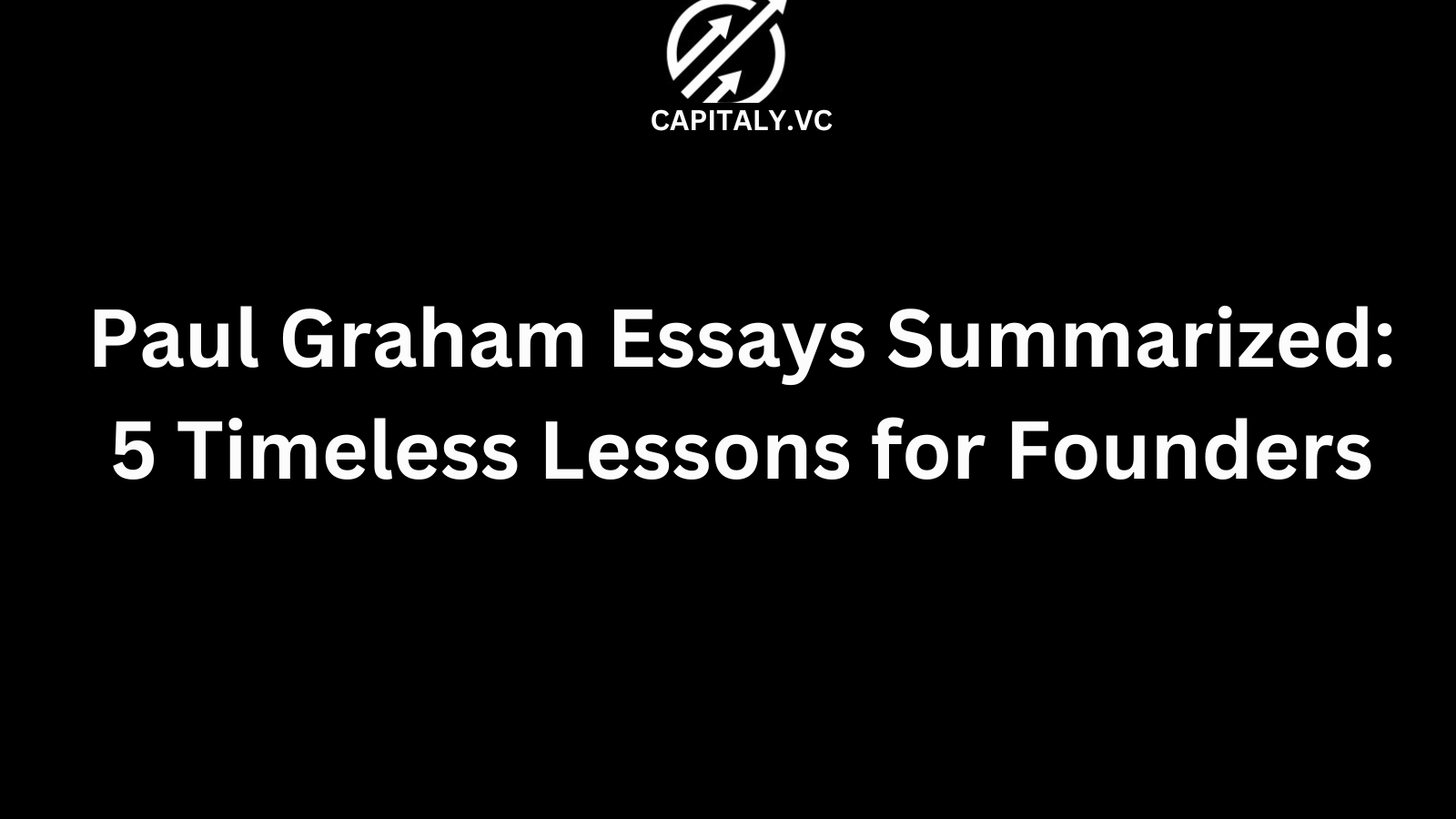Paul Graham Essays Summarized: 5 Timeless Lessons for Founders
Paul Graham Essays Summarized: 5 Timeless Lessons for Founders

Why are Paul Graham essays still a must-read for founders in 2025?
Because they offer startup wisdom that’s stood the test of time—and still gives founders a competitive edge.
In this guide, I’ll walk you through five timeless lessons drawn from his most iconic essays, each backed with real-world applications and links to explore further.

Essentials: Who Is Paul Graham?
Paul Graham co-founded Y Combinator, helped launch Airbnb and Dropbox, and wrote essays that became the startup world's playbook.
He’s part programmer, part philosopher, all founder.
His essays aren’t just theory—they’re frameworks in disguise.
Why His Essays Still Matter
The reason Paul Graham’s essays keep getting quoted?
Because they:
- Focus on timeless principles over trends
- Give direct, founder-first advice
- Are rooted in firsthand startup experience
If you’re raising capital, launching a product, or just trying to survive—these essays will ground you.
👉 For more founder-first strategies, see our blog post: How to Apply Lessons from Mark Suster’s Blog to Your Startup SEO
Core Themes Across 200+ Essays
Some key Graham-isms that show up again and again:
- “Build something people want.”
- “Do things that don’t scale.”
- “Live in the future.”
They’re not quotes—they’re operating systems.
The “Do Things That Don’t Scale” Lesson
In early startup days, scale doesn’t matter—traction does.
So PG tells founders to:
- Manually onboard users
- Write personal emails
- Solve tiny user problems in real time
This mindset flips conventional wisdom. And it works.
💡 We break this down more in: 20 Must-Know Strategies from Top Angel Investors for 2025
The Maker’s Schedule, Manager’s Schedule
One of his most cited essays explains how makers need:
- Long, uninterrupted time blocks
- Fewer meetings
- Deep work sessions
While managers thrive on:
- Short meetings
- Calendar switches
- Constant context shifts
As a founder? You need to guard your maker time like it’s money.
Ramen Profitable: What It Means
Being “ramen profitable” means you can survive on what your startup earns—even if it's just noodles.
It gives you leverage:
- You’re not desperate for VC money
- You get more time to iterate
- You can walk away from bad deals
It’s the startup version of self-respect.
Building Something People Want
YC’s north star is also PG’s mantra: Make something people want.
Not something flashy. Not something “AI-enabled.”
Something useful.
How? Talk to users. Build fast. Iterate faster.
👉 Need help identifying a strong market? Read: Founders’ Sentiment Analysis: How VCs Read Between the Lines
Startups in 13 Sentences
One of his tightest essays distills everything into 13 brutal truths.
Highlights:
- Launch quickly
- Stay small
- Avoid distractions
- Be tough
Each line could be its own startup rulebook.
Why “Relentlessly Resourceful” Wins
The best founders aren’t the smartest. They’re the most relentless.
Resourcefulness beats pedigree.
Examples:
- Airbnb sold cereal boxes to stay afloat
- Dropbox hacked its demo video to fake full functionality
PG’s point: Build momentum by any means necessary.
Handling Competition: The Graham Approach
Graham says competition isn’t what kills startups—distraction is.
Instead of watching what others do:
- Focus on your users
- Iterate quickly
- Out-listen, not outspend
👉 Want more on competitive strategy? Check out: 2025 VC Portfolio Strategies: Building Resilient Investments
PG’s Theory of Disagreement
His “Disagreement Hierarchy” helps founders navigate criticism:
- Name-calling (lowest)
- Refuting the central point (highest)
Level up your communication.
Respond to logic, not noise.
How to Write Like Paul Graham
PG’s writing is deceptively simple.
Here’s what makes it effective:
- Short sentences
- First-person clarity
- Examples over theory
- Original thought
Start writing like this, and people will start quoting you too.
Key Takeaways From His Best Essays
Some recurring lessons:
- Build before you brand
- Talk to customers early
- Don’t waste time on fluff
- Learn by doing
PG doesn’t just write about startups—he rewired how we think about them.
Audience Q&A: Most Popular PG Quotes
Here are a few bangers that live rent-free in every founder’s head:
- “Live in the future and build what’s missing.”
- “Startups = growth.”
- “The best ideas look like bad ideas.”
Each one is a compressed playbook.
How to Go Deeper (Further Reading/Links)
If this post was your intro course, here’s the master’s degree:
📚 Plus: For SEO applications of founder content, read: How to Use Paul Graham’s Essays in Blog Content
FAQs
1. Where can I read Paul Graham’s essays?
Visit paulgraham.com—they’re all free.
2. What’s the most famous PG essay?
“Do Things That Don’t Scale” is the most shared.
3. What does “relentlessly resourceful” mean?
You find a way, even when the odds are stacked.
4. Why is ramen profitability a big deal?
It gives you control and buys time.
5. Should I follow PG’s writing style?
Yes—clarity, simplicity, and logic are evergreen.
6. What’s his biggest startup advice?
Make something people want. Fast.
7. Is Y Combinator still based on his essays?
Yes. His ideas shape the YC curriculum.
8. How do his ideas apply to fundraising?
They help you focus on traction, not just storytelling.
9. Is there a CRM that supports this founder-first approach?
Yes, check out our take on Capitaly CRM
10. What should I read next?
The Evolution of Y Combinator
Conclusion
Paul Graham’s essays aren’t just startup theory—they’re a founder’s survival guide.
From being “ramen profitable” to doing things that don’t scale, his ideas shape how you think, act, and grow.
If you’re serious about building, reading Paul Graham isn’t optional. It’s oxygen.
👉 Subscribe to Capitaly.vc to raise capital at the speed of AI.



.png)